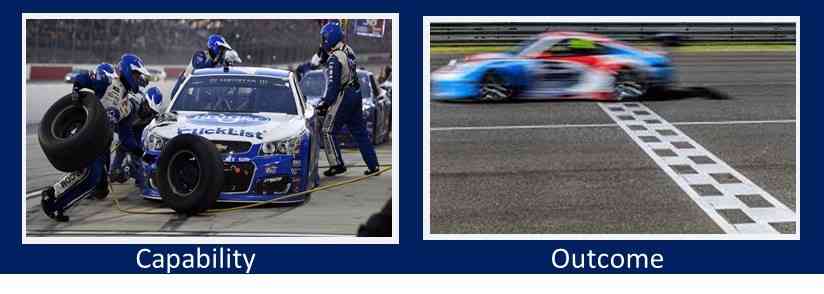Setting the Stage
It is a very tumultuous time in the B2B world. Companies are having to challenge the status quo on how they do business. Most companies built their business around a product line or small group of product lines. As these product lines mature, companies undergo commoditization. This often manifests as price pressure.
Innovation alone will no longer provide the growth and margin necessary for companies to sustain or increase their market valuations. As commoditization occurs, companies start to make a series of adjustments, including focusing on their service contract value, to maintain their growth and margin. But eventually, it becomes clear that more holistic changes are required to continue to progress.
In this age of change in the business model, the key to success is a different kind of interdependency with your valued customers. We term this Entanglement – a more permanent and valuable relationship for both parties.
B2B companies may follow different near-term paths to address the business model changes, focusing on XaaS, Customer Success, Intimacy, and/or Renewable Differentiation. One thing is consistent — these businesses want to change their relationships with their customers to become more than vendors. This is such a big change: to move from inside the company pushed out to the customer, to become at-the-customer.
The road to accomplishing this move travels straight through the Professional Services organization. Why does this historically tag-along business become central to the new way of doing business? It is an interesting confluence of two things.

- PS is at the customer. Think about it. Sales is pushed out to the customer and is very episodic. Product development and R&D is far from the customer. Marketing is gathering data, but not often with the customer. The rest of the company – Finance, Operations, Executive Leadership, and HR – are far from the day-to-day life of the customer. By contrast, PS is working in the trenches, day in and day out, helping the customer implement and use products. This provides PS a different relationship with the customer and a unique point of view on how to get results at the customer. Finally, PS also sees first-hand the effectiveness or ineffectiveness of product and marketing messaging, product readiness and capabilities, sales efforts and commitments, quality and flexibility of contracts, etc.
- PS is solution driven – The PS role is to solve problems. They are the solution people. PS works in chaotic environments with people who are not necessarily motivated to change the way they work to accommodate the products their companies have purchased. In addition, each customer has different levels of capability and willingness to dedicate staff to do their part in an implementation. Further, PS reports out to customer managers or executives who are challenging them all the time on progress and expense. These factors combine to make PS the best-suited part of a B2B company to work with the customer on broader, higher value issues.
Transforming PS from a capability focus (e.g., implementation of a specific product, user training, or workflow design and optimization) to an outcome focus (i.e., driving a business result such as simplifying customer interface, driving down costs, or meeting a government mandate) has benefits for the PS business itself in selling, talent development, delivery quality, and other areas. But more strategically important to a complex B2B company, this shift will lead the broader company to focus on the changes required on the journey to becoming entangled with its high-value customers.
This is not a simple process — there is much to accomplish for PS to seamlessly play this role. In upcoming blogs, we will discuss the challenges PS faces in fulfilling this mission and how to overcome them. In addition, we will deal with the issue of how to help manage the rest of the company as PS undertakes and eventually accomplishes it mission.
Written by: Dean McMann
About the Author: Dean McMann is a Founding Partner at McMann & Ransford with 35+ years of experience in consulting and professional services. He is a sought-after expert and speaker on topics of: B2B differentiation, professional services best practices, and overcoming commoditization. In addition to his extensive experience in the Professional Services space, Dean also serves on the board of various non-profit organizations.
